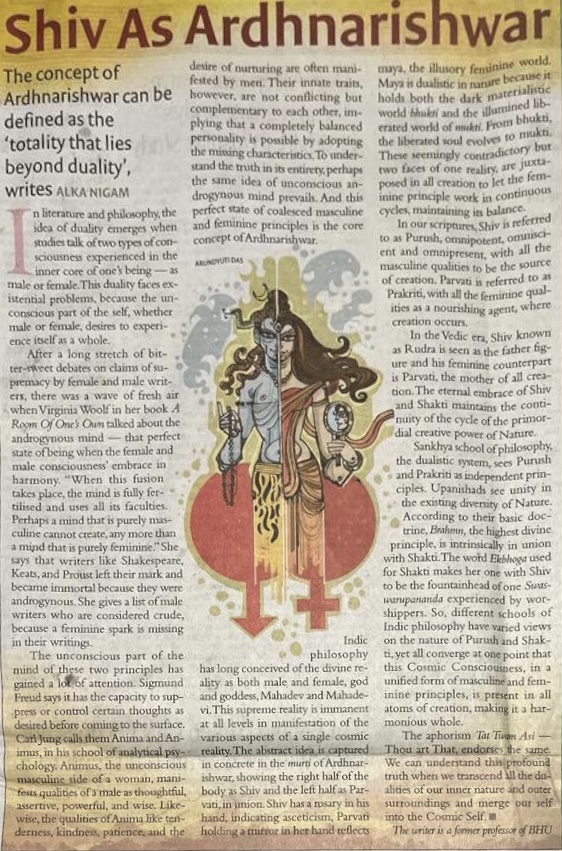Speaking Tree, Times of India: July 1, 2018
https://www.speakingtree.in/article/precious-teachings
SHRIMADBHAGWAT GITA, a unique dialogue between God Shri Krishna and His disciple Arjuna, contains the quintessence of Hindu thought. Arjuna is the eternal sadhak in us, ignorant about his raison dˆetre. In the battle of life, he asks the creator of the universe seated in our hearts, the questions that baffle him. In the eighth chapter of GITA Arjuna asks Krishna seven questions. The second one –what is adhyatma -is an all -encompassing question about God and man. Its answer is the master key to many locked doors of our mysterious stay on this earth. Krishna’s reply is uniquely simple – our svambhav is adhyatma – adhi means underlying and atma means soul. The urge to know the true nature of his soul is man’s suambhav. Paramhansa Yoganandaji in his precious commentary on GITA “God Talks With Arjuna” defines adhyatma as the knowledge of an inherent link between “the underlying ‘universal soul’ …and the individual dream soul encased in a body dreamed by God.” This world is a dream land of ‘maya’ and taken as a reality by us. We remain involved in the snaring activities of the body and are so obsessed with its desires that we forget the presence of indestructible soul encased in our perishable body. The moment our intelligence questions the purpose of our existence- who am I? our journey of adhyatma begins. This is called spirituality – – the science of learning the ways of recognizing our own soul as the eternal part of the universal soul. Yoganandaji tells that the illusion of many souls “gives the Lord an opportunity to play with the conscious dream- souls in His cosmic drama.” Different religions tell different paths and lay down different guidelines to reach one universal truth. Religion begins with dualism – a stage when God is seen as a far-off object away from the soul that resides within body. Religion assists in tearing the veil of ignorance covering the consciousness till we reach the stage of Advaitya when the tiny drop of self melts into the cosmic ocean and becomes one with it. The duality ends and self realization happens. Adhyatma redirects the flow of human energy from centrifugal to centripetal, hence lays bare the inner truths of consciousness beyond the narrow boundaries of time and space.
Philosophers and thinkers all over the world have pondered over this seemingly complex , nonetheless a pertinent question- Who am I? KNOW THYSELF is the ancient Greek aphorism inscribed on the Temple of Apollo at Delphi. This aphorism has layers of meanings. Socrates encouraged the practice of this quest saying, “The unexamined life is not worth living.” Plato believed that the soul that is eternal and incorporeal is the essence of our being. His disciple Aristotle agreed with Plato but disagreed that the soul has a separate entity. The father of modern Western philosophy, Descartes’ comes to the conclusion that he exists because he thinks – – “Ï think therefore I am”. But in what form? The use of senses to perceive the body is unreliable. Knowledge that cannot be doubted comes from ‘Thinking’. This power is the essence of Being. He defined the thinking power of mind as soul. He was of firm conviction that body characterized by matter and soul characterized by thought are two distinct substances. Mind could exist without body whereas the existence of body without mind is meaningless, hence he gave priority to the mind. Many spiritual traditions promote this approach in many different ways.
The ancient rishis of India developed step- by -step rules of reuniting soul with Spirit. The four Vedas, the fountainhead of spiritual and yogic traditions, are perhaps the oldest books in the world. The Vedic religion is considered by David Frawley, “the teaching of noble souls “or Arya Dharma– “the most widely developed and practiced of all religions throughout human history.” He says Buddha and Zoroaster of ancient Persia also called their religion Arya Dharma. Vedic religion comprises of the secret spiritual secrets found mainly in the Vedas, Upanishads and the Bhagwat Gita which is a part of the epic Mahabharata. Different religions have different gods. In Vedic religion there is nothing that is not God– ISHA VYASAYAMIDAM SERVAM YATKINCHIT JAGATYAM JAGAT. The Upanishads are loaded with the direct knowledge of God. Direct because these are the reportings of the direct experiences of great Rishis given to their disciples. The teachings of god Varun to his son Bhrigu, Yama to a boy Nachiketa, sage Gautama to Satyakama, Uddalaka to his son Shwetketu are a few precious pearls of Hindu thought. These insights raise the curtain of ignorance from our luminous soul and connects it with the Omnipresent, One Spirit. At the time of death, body perishes but eternal soul goes on its eternal spiritual journey. This cycle continues till the self knows I am That –AHAM BRAHMASMI — and this realization is adhyatma resulting in SAT- CHIT- ANANDA—ultimate -experience of -bliss.

Very well explained the true philosophy of life…